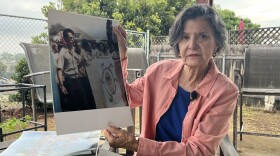The U.S. Supreme Court heard arguments Monday in two cases testing whether a lawyer's mishandling of a plea bargain offer should be sufficient reason for a defendant to get a second chance to accept the offer.
Both cases involve defendants who got prison terms much longer than they would have under plea bargains offered by the prosecutor. In one case, the defendant's lawyer never told his client about the offer. In the other, the defense lawyer advised against taking the offer based on a clearly erroneous understanding of state law.
The first case argued on Monday came from Michigan, where Anthony Cooper was charged with assault with intent to murder after he shot a woman in the thigh and buttocks. Prosecutors offered a plea deal with a recommended prison term of roughly four to seven years, but Cooper's lawyer advised him to reject the offer, saying Michigan law would not allow for an attempted murder conviction when the wounds were below the waist. That advice was indisputably wrong. Cooper was convicted and sentenced to three times as much jail time as he would have served under the offered plea deal.
On Monday, his new lawyer, public defender Valerie Newman, told the Supreme Court that the trial lawyer's bad advice denied Cooper the effective assistance of counsel guaranteed by the Constitution. But the justices didn't seem to buy the argument, with Justice Anthony Kennedy noting that Cooper concedes he got a fair trial, and Justice Ruth Bader Ginsburg observing that even if Cooper had accepted the plea, the judge would have been free to give him a longer prison term for shooting his victim four times.
Missouri Case
The justices seemed a bit more conflicted by the second case, involving Missouri college student Galin Frye, who was charged with a felony for repeatedly driving while his license was revoked. Prosecutors wrote to his lawyer offering to reduce the charge to a misdemeanor if Frye would plead guilty and agree to serve 90 days in jail.
But the lawyer never passed along the offer to Frye, who later pleaded guilty, with no conditions, and was sentenced to three years in prison. He claims now that he was denied the effective assistance of counsel guaranteed by the Constitution. But at the Supreme Court on Monday, Missouri Attorney General Chris Koster told the justices that the Constitution does not provide for a right to a plea bargain.
Koster said that if the courts begin to second-guess plea bargain offers, it would jeopardize "finality" of the entire criminal justice system, a system that in fact resolves more than 90 percent of the criminal cases in the country not by trials, but by plea bargains.
Supporting the state's argument, Assistant U.S. Solicitor General Anthony Yang contended that the Constitution only guarantees a right to a fair trial, not a fair plea bargain.
Justice Kennedy wondered why it isn't a problem that Cooper's lawyer never told him about the plea offer. Yang contended that because Cooper still pleaded guilty, he waived his trial rights and thus had no right to complain.
Justice Elena Kagan observed that "there are different kinds of unfairness." One is "when you are badly advised." The other is when "you and 10 other guys are all in the same situation, and those 10 other guys come up with a favorable plea deal because their lawyers are paying attention, and you come up with an unfavorable plea deal because your lawyer has fallen asleep." In such a case, Kagan suggested, the unfairness does "need to be addressed."
No, replied Yang, because there is no constitutional right to a plea deal.
Ginsburg at one point noted that the defendant was denied his right to make an intelligent judgment about his case because of his lawyer's misconduct. But she also noted that the prosecutor here had done nothing wrong, and questioned why the court should "disarm" the prosecutor and take away his right to change his mind about a plea bargain.
Copyright 2022 NPR. To see more, visit https://www.npr.org. 9(MDAzMjM2NDYzMDEyMzc1Njk5NjAxNzY3OQ001))






